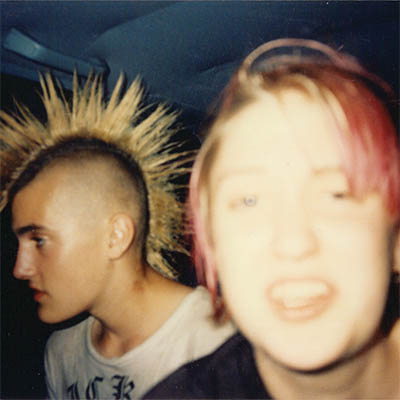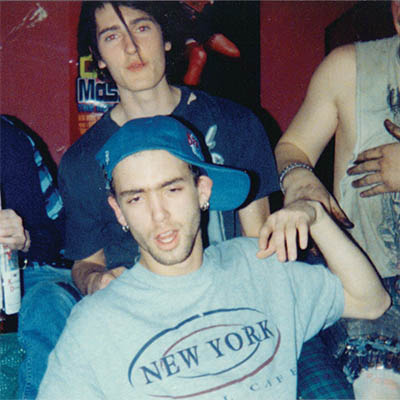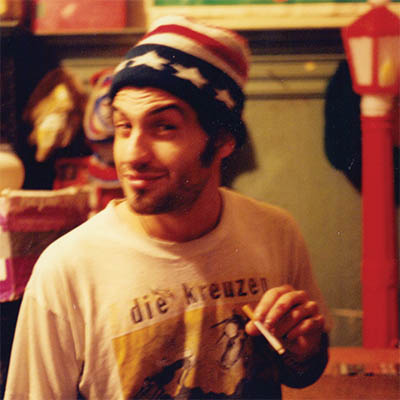The naked cult on the Muthaship
Looking back on a wild time with Tulsa’s favorite adopted punk band, Hickey
In 90s Tulsa, you could still get your ass kicked for looking like a freak. The cops regularly beat up your friends, took you to jail, pulled you over for no reason, harassed you on the street. Strange guys still yelled obscenities at you even if you were just two girls trying to get food after the bar closed. It felt like we were always fighting just to exist, surrounded on all sides by religious fanatics, homophobes, misogynists, rednecks, and racists.
Then Hickey, or The Naked Cult of Hickey as they were also known, rode in on their van, The Muthaship, to save us, or at least to let us know we were already saved. It would have been very easy to believe the trio—Matty Luv, Aesop, and Rizzler (aka Dwight Trash)—were a band of traveling evangelists, and that we, their audience, were having a “Come to Jesus” moment of pure rapture in their presence, a rock ‘n’ roll hallelujah chorus of “The Only Lesbian in Tulsa” sung out word for word, everyone joined together in this moment, a great moment, purely because it was theirs and it was happening in the most unlikely city.
Though Hickey was from San Francisco, they became honorary Tulsans from the moment they played the Hercules Lounge in 1994, perhaps because their lack of aesthetic fit perfectly with our own. They felt the way we felt and said the things that rang true at that time in our lives. They made fast, catchy songs with squealing guitar and animalistic drums, held together by throbbing bass, on the verge of collapsing into chaos yet somehow never crossing that line. The lyrics were a fine balance of humor, intelligence, politics, and poetry—true cynicism mixed with a deeply held belief in their own moral code. It was why some lived in shithole houses and put on shows for no money. Here was a smart, hilarious band telling us we were the good guys, to keep fighting the good fight. It was everything we needed when everything was falling apart.
 I heard Hickey before I ever saw them play live. I was 17, and my best friend brought their 7” home from his first punk show. The lyrics “Everyone’s a whore...life is cheap, but living is expensive...” warbled through my speakers and into my consciousness. I knew I was listening to greatness, something that was happening in my own time, not greatness that had happened in some far away place. I had heard the Sex Pistols, The Buzzcocks, The Clash—great bands that were unreachable on so many levels. This was different. This was a band that I could see and talk to, experience in its heyday. We listened to that 7” countless times and played it for everyone. By the time they played their second Tulsa show in Chris Fitzpatrick’s basement, it was apparent that this was something big.
I heard Hickey before I ever saw them play live. I was 17, and my best friend brought their 7” home from his first punk show. The lyrics “Everyone’s a whore...life is cheap, but living is expensive...” warbled through my speakers and into my consciousness. I knew I was listening to greatness, something that was happening in my own time, not greatness that had happened in some far away place. I had heard the Sex Pistols, The Buzzcocks, The Clash—great bands that were unreachable on so many levels. This was different. This was a band that I could see and talk to, experience in its heyday. We listened to that 7” countless times and played it for everyone. By the time they played their second Tulsa show in Chris Fitzpatrick’s basement, it was apparent that this was something big.
I didn’t see them live until they played their third Tulsa show at The Eclipse, owned by Tulsa’s biggest personality, Kay Rahal. The show was all ages and packed, with seemingly every weirdo in Tulsa in the same room.
Tulsa had recently enacted a new curfew for kids under 18. When it was becoming evident some kids might have to leave before the show was over, the drummer stood up behind his kit and yelled into his microphone, “First, they don’t trust you with real beer, now they don’t even trust you with real time!” The crowd exploded into cheers and laughter.
The after-party was at a house we called “Headquarters.” My roommate ran off with Matty, the singer and guitar player, while I hung out with Aesop, the drummer, whom I’d previously met when he came through town playing drums for Grinch.
 I’m not sure how it was decided Hickey’s next show would be at my house (affectionately named “The Crackhowse”) but a few months later they were preparing to play in my living room. It was a large, dilapidated two-story house, and we thought we could easily host a large audience without a problem. We were in no way prepared for the 400 people who showed up. Before the opening band could set up, we were surrounded by cops—at the door, in a paddy wagon out front, and in a helicopter shining a spotlight onto our roof, where some kids had crawled out to enjoy the spectacle. As the most responsible resident, it fell on me to talk to the cops.
I’m not sure how it was decided Hickey’s next show would be at my house (affectionately named “The Crackhowse”) but a few months later they were preparing to play in my living room. It was a large, dilapidated two-story house, and we thought we could easily host a large audience without a problem. We were in no way prepared for the 400 people who showed up. Before the opening band could set up, we were surrounded by cops—at the door, in a paddy wagon out front, and in a helicopter shining a spotlight onto our roof, where some kids had crawled out to enjoy the spectacle. As the most responsible resident, it fell on me to talk to the cops.
I was sheltering a troubled 15-year-old runaway girl, whom they caught drunkenly peeing off of the roof. They arrested her. One of the officers implied that because she was drunk, she was having sex with every guy inside the party. Furious, I berated him and his commanding officer and somehow convinced them that it was inappropriate to talk about a teenage girl in that way, especially in front of her. Their guilt and regret saved anyone else from being arrested, but it couldn’t save my runaway, whose parents knew where she was and couldn’t have cared less. The cops took her to juvie.
About 200 people left the party at that point. The remaining mob crammed into my house. The only place I could sit was on the stairs behind the bands. By that time I was sober, exhausted, and worried about my adopted teenager. I wish I could say I enjoyed watching Hickey play that night, but the memory is a blur of adrenaline and anxiety.
At the end of the night, Matty and Aesop gave me records and a canister of pepper spray as thank-you gifts. Just then, the phone rang. It was my teenage runaway, who had escaped the juvenile institution by jumping out of a second-story window and shimmying down a basketball hoop. She was waiting at a friend’s house and wanted me to pick her up. And that’s how the decision was made to follow Hickey to Fort Smith, Ark. We would hide our runaway at a friend’s, so if the cops came looking, she would be safe.
That night, Aesop, the runaway, and I stayed up drinking and playing UNO. We wrote silly messages like “I love Snausages!” all over my sleeping friend Nadia. Later that morning I decided that I, too, needed a break from Tulsa. I gathered my courage and asked the band if I could join them on their tour. They agreed, and I climbed into the Muthaship and traveled the South with my favorite band. These guys looked like every parent’s worst nightmare—but they were perfect gentlemen. They called me their “14-year-old roadie” (I was actually 19) and bought me Taco Bell when I was broke. I returned the favor by macing a violent maniac for them in Alabama.
I learned every city wasn’t like Tulsa—there weren’t always throngs of eager kids waiting to shower them with food and praise.
After tour, Matty welcomed me and my friend into his SF home for three weeks, no questions asked. He platonically shared his bed, his food, his time, and gave me a special prize for telling the best and most traumatic loss-of-virginity story while coming down from some excellent crystal meth. The prize was a necklace that simply said “FUCK” in gold letters. I still have it.
 As it turned out, that would be their last tour, and the last of the band as well. They broke up in Tucson in the fall of 1997. Rizzler, bassist and van mechanic, ran off to make crazy things through redneck engineering. Aesop plays violently good drums for several metal bands in the Bay area and raises his amazing kiddo in Oakland. Matty Luv, lead singer, guitarist, and shit starter extraordinaire, died in October 2002, leaving a hole in the heart of everyone who knew him.
As it turned out, that would be their last tour, and the last of the band as well. They broke up in Tucson in the fall of 1997. Rizzler, bassist and van mechanic, ran off to make crazy things through redneck engineering. Aesop plays violently good drums for several metal bands in the Bay area and raises his amazing kiddo in Oakland. Matty Luv, lead singer, guitarist, and shit starter extraordinaire, died in October 2002, leaving a hole in the heart of everyone who knew him.
I last saw Matty at Mission Records the night he played with Dr. Dre Del as DJ Queenie. I was only able to talk with him for a moment, but I did thank him one more time for letting me stay with him before his girlfriend dragged him away. I talk to Aesop through the internet now and again, but I haven’t seen Rizzler since Matty’s funeral. I don’t listen to Hickey as much, but still I have their logo tattooed on my wrist as a reminder, and if you ask me I’ll tell you some stories, but most importantly I will put on their music, music that makes me feel that special blend of nostalgia and hope for the future, and make you listen to the best band that Tulsa ever loved, and who loved Tulsa in return.


.jpg)
.jpg)
